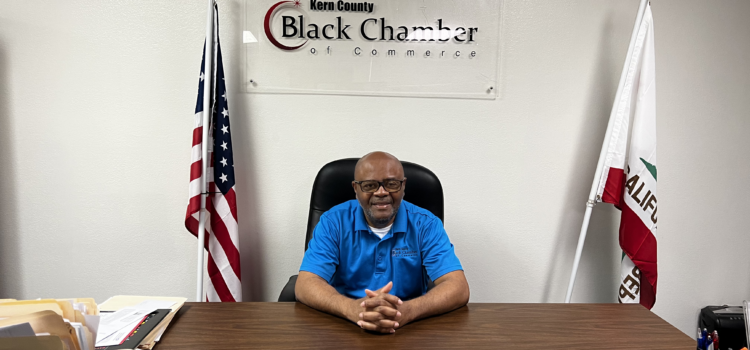
Editor’s Note: To celebrate Black History Month, Kern Sol News is highlighting notable Black leaders in Kern County who are working to create positive change in their community.
Kern County Black Chamber of Commerce (KCBCC) President Nick Hill aims to be a voice for both his members and his community.
“We’re right here in the middle of Black History Month and we always talk about the underserved and the disadvantaged, but we never add two more words to that equation: overlooked, and over scrutinized,” Hill said. “We are no longer being silent when we’re being left out.”
Before becoming president of the KCBCC, Hill had career backgrounds in restaurant management, a stint in the Chicago police force, experience in the rent-to-own industry, and his own business in the entertainment industry.
Hill came to California from Illinois following the death of his mother in March of 1988; she had cancer and Hill had spent time commuting back and forth between the states. Once he migrated into California, he settled in Sacramento where he continued his work in the restaurant management industry for a brief period of time.
When he decided that he no longer wanted to work in restaurant management, Hill said that he began working in the rent to own industry at the bottom of the ladder.
Hill took over a store in Oxnard, where he brought the store’s ranking from #123 in the company to #7 in just 14 months. Following his success with that store, Hill was asked to work in Taskforce, where he was sent to various California cities as a corporate trainer; the last city he was sent to was Bakersfield.
“Six months after I got here they sold the company,” Hill continued. “So I decided to start my own company. This was in 1998, here in Bakersfield.”
Hill went into the entertainment industry and became a DJ where he was able to work as a promoter and build his business at the Elks Lodge. He continued doing events around town and by 2000 he was able to purchase his own lot and open a club downtown.
By 2003, Hill began his affiliation with the KCBCC and from 2013 to 2015 he first stepped into the role as president. In 2015, Hill left the presidency and became a consultant for the California State Black Chamber before returning to KCBCC as president in 2020.
Despite his successes, Hill is still witnessing and experiencing differential treatment for both the Black community in Kern County and within the chamber.
“I don’t want history to continue to repeat itself,” Hill claimed. “Do we stay silent? Or do we call out these instances of oppression?”
Hill chose to do the latter, revealing that he sent letters out to a few companies to discuss the inequalities in treatment between his chamber and the other chambers within Kern County.
Hill believes these disparities are derived from a lack of support and seed money for the KCBCC. With this money, chambers are able to produce proposals, be properly staffed, and have all their bills paid.
“These are some of the things that they [the other chambers] don’t have to worry about. It’s not a second though for them,” Hill continued. “But this is always in the forefront of the Kern County Black Chamber of Commerce. Do we have funds for staffing? Do we have funds to make sure our rent is paid on time and utilities are taken care of?”
Hill says that his chamber’s ambition is to have a business incubator where they will be able to host several programs and workshops for their members.
Hill also revealed that the KCBCC’s ability to advocate for its members and keep them informed has also been effected by this lack of support: “If there’s information that’s coming down the pipe from the city, the county, the state, or federal government then nine times out of 10 the Kern County Black Chamber of Commerce is not in that loop. Historically, or systemically, the African American population in Kern County has been left out. When this information finally does trickle down it’s too late for them to properly act on it. This leads to missed opportunities for our members; the major thing about that is — if we’re the Kern County Black Chamber of Commerce and our members depend on us to advocate for them and we’re being left out of the loop it hinders our abilities.”
“We’re not asking for a handout,” Hill clarified. “The only thing we’re doing is asking that you keep us on a level playing field with everyone else.”
Hill believes that the roadblocks faced by Black businesses and the KCBCC can’t be eliminated by staying silent. Hill also believes that the road to eliminating these hindrances is a long one, but there has been progress made.
“Year after year after year, we say it’s time to celebrate Black history. And yes, it is time to celebrate Black history. But what about celebrating Black futures?” said Hill. “We do the same thing every year and talk about systemic racism. Those days are over. Now, it’s time to talk about economic empowerment.”
Due to the COVID-19 pandemic and other barriers, Hill shared that small businesses have faced a tremendous uphill battle that has decreased the possibility of minority businesses’ ability to survive. He suggests that helping fix these issues comes with increasing small business utilization.
“Create more training opportunities, funding, and bonding to increase inclusion for minority businesses to at least get their foot in the door,” says Hill. “Create branding, marketing, and basic bookkeeping to continue to stay competitive.”
Outside of work, Hill enjoys sports and spending time with his grandchildren. He’s also a single parent to a 16 year old daughter. In addition, Hill participates in volunteer work for Project Best, the Friendship House, and the California High Speed Rail Business Advisory Council.